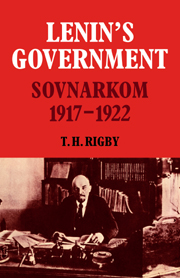Summary
The Constitution of the USSR describes the Communist Party as ‘the leading and directing force of Soviet society and the nucleus of its political system, of all state organisations and all voluntary organisations’. In practical, institutional terms, this means the superordination of the executive bodies of the party over those of the state at the centre, in the constituent republics, and right down to the lowest level of local government. In official doctrine, this institutional embodiment of the party's leading and directing role is seen as essential to safeguarding the socialist order and ensuring its progressive transformation into the fully communist society envisaged by Marx and Lenin. It was above all the apprehension that the Czechoslovak Communist Party was abdicating this leading and directing role that motivated the Soviet Union and its Warsaw Pact allies to invoke the principle of ‘proletarian internationalism’ and intervene in Czechoslovakia in 1968 in order to overturn the Dubček regime and its reforms.
The best known and most important manifestation of the party's leading and directing role is that the effective government of the Soviet Union is not formally an organ if the state at all, but a party body, the Politburo of the Central Committee. It is the Politburo that takes the final and binding decisions at its weekly meetings on all significant questions of internal and foreign policy and whose members have final responsibility for the various bureaucracies through which these decisions are implemented.
- Type
- Chapter
- Information
- Lenin's GovernmentSovnarkom 1917-1922, pp. ix - xiiPublisher: Cambridge University PressPrint publication year: 1979



